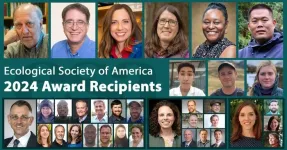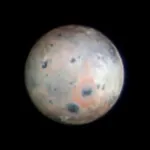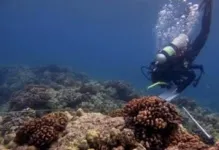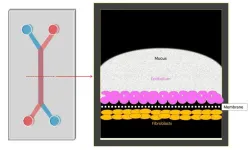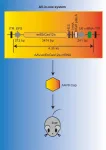These awards are designed to not only reward past achievements, but also to inspire a broad audience of scientists, educators and students, opening the door to new insights and collaborations that will further the impact of ecological research.
“The Ecological Society of America is immensely proud to honor this year’s distinguished awardees,” said ESA President Shahid Naeem. “Their contributions across various domains—be it through pioneering research, outstanding service or dedicated teaching—embody the spirit of this society and the ecological community. Congratulations to all for advancing the frontiers of ecological science.”
ESA will present the 2024 awards during a ceremony at the Society’s upcoming Annual Meeting, which will take place in Long Beach, California Aug. 4–9.
Learn more about ESA awards.
Eminent Ecologist Award
Juan Carlos Castilla, Emeritus Professor, Department of Ecology, Pontifical Catholic University of Chile
The Eminent Ecologist Award honors a senior ecologist for an outstanding body of ecological work or sustained ecological contributions of extraordinary merit. This year’s Eminent Ecologist Award goes to renowned ecologist Juan Carlos Castilla.
A prominent figure in marine ecology and a pioneer of coastal resource management, Castilla has profoundly influenced both the scientific community and environmental policy in Chile. His research on human impacts on Chilean coastal ecosystems and his work promoting sustainable resource use have reshaped global approaches to coastal zone management and conservation.
Spanning decades, Castilla’s research demonstrates the critical role of keystone species in rocky intertidal and marine ecosystems, and how humans serve as super-keystones in these settings. A co-founder of the Pontifical Catholic University of Chile’s Coastal Marine Research Station at Las Cruces, one of the country’s first no-take marine research facilities, Castilla gained early recognition for his work showing how benthic shellfish harvesting by humans had fundamentally restructured the region’s coastal ecosystems. Since then, his work to understand the structure and dynamics of coastal communities continues, with a growing focus on conservation, resource management and outreach. His scientific insights underpin the development of marine protected areas, in Chile and elsewhere.
One of Castilla’s greatest achievements is working collaboratively with local fisher communities that serves as a model for science-informed, community-based management of marine resources. His meticulous study of the unique Chilean muricid mollusk known as the “loco” and its fishery’s collapse in the 1980s led to the establishment of Chile’s first Management and Exploitation Area for Benthic Resources. These preserves—co-managed by artisanal fishers and the Chilean government, with input from scientists—grant fishers exclusive access to benthic coastal resources, thereby empowering local communities to steward their resources effectively. Castilla’s innovative engagement with local knowledge-holders forged unprecedented alliances between scientists, policymakers and stakeholders. By fostering dialogue and collaboration, he has continued to spearhead legislative reforms that advance sustainable resource management practices.
Castilla’s contributions have earned him prestigious accolades, including the BBVA Foundation Award, the Mexico Prize for Science and Technology, the Ramon Margalef Prize, the Chile National Prize in Science and Technology and membership in institutions like the U.S. National Academy of Sciences and the Third World Academy of Sciences. Beyond his scientific accolades, Dr. Castilla’s enduring legacy is exemplified by his mentorship and advocacy, nurturing a generation of environmental leaders who continue to shape the trajectory of ecological research and policy worldwide.
Distinguished Service Citation
Alan R. Berkowitz, Head of Education, Cary Institute of Ecosystem Studies
Alan R. Berkowitz is the recipient of the 2024 ESA Distinguished Service Citation, which recognizes long and distinguished volunteer service to ESA, the scientific community and the larger purpose of ecology in the public welfare. A respected ecologist and educator, Berkowitz has significantly shaped the field of ecology through his extensive work in education and community outreach.
Over four decades, Berkowitz’s contributions have fostered diversity and educational innovation within ESA. Starting in 1988, he was pivotal in the establishment of ESA’s Education Section and later served as the first Vice President for Education and Human Resources. During his tenure, he oversaw the creation of the Education Office and co-founded the Presidential Award-winning SEEDS Program, which promotes minority recruitment in ecology. In addition, he was instrumental in developing the Four-Dimensional Ecology Education (4DEE) Framework, a cornerstone for ecology education nationwide.
Beyond ESA, Berkowitz’s work bridges the gap between ecological research and education, enhancing how ecology is taught from kindergarten through postgraduate studies. Berkowitz directed the Cary Institute’s Research Experiences for Undergraduates program for 35 years, headed the Education Team for the Baltimore Ecosystem Study for 25 years and now is leading an initiative to integrate Earth and environmental science into all Baltimore City’s high schools, demonstrating a lifelong commitment to advancing inquiry-based learning and ecological literacy.
Robert H. MacArthur Award
Kathleen K. Treseder, Howard A. Schneiderman Endowed Chair and Professor, Department of Ecology and Evolutionary Biology, University of California, Irvine
The Robert H. MacArthur Award honors an established ecologist in mid-career for meritorious contributions to ecology, in the expectation of continued outstanding ecological research. Award winners generally are within 25 years of the completion of their Ph.D. This year’s award is given to Kathleen K. Treseder.
Treseder’s research blends theoretical and empirical studies in ecology, advancing our understanding of plant-microbe interactions, soil carbon and nutrient dynamics and the responses of microbes and ecosystems to climate change. Her work sheds light on the critical role of soil fungi in ecosystems, demonstrating their importance in nutrient mobilization and their impact on whether forests act as carbon sources or sinks. Typifying the trailblazing nature of her research, Treseder developed a patented nanotechnology methodology to study nutrient uptake and movement by fungi, enhancing our grasp of fungal biology and ecology.
With over 28,000 citations, Treseder’s many publications are among the top 1% of cited papers for 2018–2022, illustrating her research impact. She has also been a principal or co-principal investigator on grants totaling over $7 million in the past five years. Beyond her primary research focus, she has explored how climate change influences the spread of pathogens, notably the fungus causing Valley Fever. Her models predict a significant expansion of this pathogen, leading to increased disease spread, and she has collaborated with health officials to develop disease surveillance and mitigation strategies.
A prominent figure in the scientific community, Treseder is a sought-after keynote speaker and a recipient of numerous awards including the Marsh Climate Change Award from the British Ecological Society. She is also an elected fellow of several prestigious institutions, including the American Association for the Advancement of Science, the American Academy of Microbiology and the Ecological Society of America.
Treseder’s contributions extend into public service; she was recently elected to the Irvine City Council, where she advocates for impactful environmental policies. Her highly creative research and public service exemplify the qualities of her award’s namesake, Robert MacArthur, and ensure that her work will influence the field for years to come.
Eugene P. Odum Award for Excellence in Ecology Education
Kari Bisbee O’Connell, Associate Director, STEM Research Center, Oregon State University
Odum Award recipients demonstrate their ability to relate basic ecological principles to human affairs through teaching, outreach and mentoring activities. This year’s Odum Award for Excellence in Ecology Education is presented to Kari Bisbee O’Connell, associate director of the STEM Research Center at Oregon State University.
Through her innovative study and promotion of inclusion and belonging in field-based research, O’Connell has significantly influenced the field of ecology instruction and science education more broadly. As a leader in the NSF-funded Undergraduate Field Experiences Research Network (UFERN), she has been pivotal in developing more inclusive models of field education that promote equity and access. Under her guidance, UFERN has fostered collaboration among educators and researchers across numerous research stations and laboratories, supporting the development of evidence-based teaching practices, effective assessment tools and original research on student learning. Through UFERN, O’Connell advances the cause of enhancing field experiences for undergraduate students—particularly those from minority groups.
In her role at Oregon State University, O’Connell is instrumental in several other significant projects aimed at enhancing ecological education. Her initiatives include improving public engagement with science at Long-Term Ecological Research sites, fostering opportunities for middle and high school students to connect with old-growth forests at the H.J. Andrews Experimental Forest and facilitating community engagement with wildfire research. Additionally, she focuses on professional development for middle and high school science teachers, developing their data literacy and cultivating a deeper understanding of ecosystems and the scientific process.
O’Connell’s work is crucial in identifying and implementing strategies to make field stations and marine laboratories more inclusive, and her efforts have significantly shaped practices at Oregon State University and beyond. Her holistic approach to ecology education will have a lasting impact on the academic community and on public understanding of ecological science.
Commitment to Human Diversity in Ecology Award
Porché L. Spence, Assistant Professor of Environmental Studies, Department of Natural Resources and Environmental Design, North Carolina Agricultural and Technical State University
The Commitment to Human Diversity in Ecology Award recognizes long-standing contributions of an individual toward increasing the diversity of future ecologists through mentoring, teaching or outreach. Porché L. Spence is the recipient of this year’s award in recognition of her dedicated efforts to educate, mentor and recruit students from diverse racial and ethnic backgrounds into ecology and STEM fields.
Diversity and inclusion are at the core of Spence’s academic and professional endeavors. Her research primarily focuses on the conservation of natural resources and the scholarship of teaching and learning in STEM, with a particular emphasis on enhancing diversity and persistence of students of color in ecology and related disciplines.
As co-director for the Scholars for Conservation Leadership Program, which provides underrepresented students with career development opportunities, Spence develops programming and mentors students from diverse backgrounds. She also co-developed and co-directed a high school summer program focused on exposing students of color to forest ecology by participating in an authentic research project and presenting their findings at conferences. Currently, she is mentoring a subset of these high school students to prepare a manuscript for peer-reviewed publication.
In addition to her work with graduate, undergraduate and high school students, Spence develops innovative educational tools like the Food, Energy, Water Learning Module Workbooks, designed as a low-cost experiential learning curriculum for elementary and middle schools. Her involvement in diversity and education initiatives includes significant roles in a number of committees and working groups, such as the ESA 4DEE Assessment working group and the NSF-RCN Undergraduate Network for Increasing Diversity of Ecologists.
Spence’s work as a mentor and educator enriches her students’ academic and professional journeys and strategically addresses the broader challenge of diversifying the ecological sciences. Her exemplary efforts in teaching, mentoring and outreach activities have left an indelible mark on the discipline, embodying the essence of the Commitment to Human Diversity in Ecology Award.
International Ecology Award
Yanjie Liu, Professor, State Key Laboratory of Black Soils Conservation and Utilization, Northeast Institute of Geography and Agroecology, Chinese Academy of Sciences
The International Ecology Award recognizes an outstanding early- or mid-career ecologist from a developing nation. This year’s award is given to Yanjie Liu.
Liu is an accomplished ecologist whose research provides critical insights into invasion biology amid global changes. His work notably explores the underappreciated role of microbial processes in biological invasions, as well as the ways that insects and native biodiversity can resist plant invasions. Other research avenues include how urbanization and light pollution affect plant communities and how interactions between plants and other organisms play out in human-altered ecosystems.
With an active research program that spans multiple continents and ecosystems, Liu’s scientific collaborations have generated numerous influential publications. His research on the resistance of native diversity to plant invasions, and the complex interactions of plants with soil and insects under changing environmental conditions, continues to influence the field widely. Liu’s work and innovative approach to addressing complex ecological questions exemplify the criteria to receive the International Ecology Award.
George Mercer Award
Megan L. Vahsen, Michael J. Blum, J. Patrick Megonigal, Scott J. Emrich, James R. Holmquist, Brady Stiller, Kathe E. O. Todd-Brown and Jason S. McLachlan
ESA presents the 2024 George Mercer Award to the authors of “Rapid plant trait evolution can alter coastal wetland resilience to sea level rise,” published in Science Jan. 26, 2023.
The George Mercer Award was established in 1948 and is given annually for an outstanding ecological research paper published within the past two years with an early-career lead author.
This study calls attention to the significant, yet often overlooked, role of rapid evolution in shaping how ecosystems respond to global change. Examining a dominant coastal marsh sedge, the research reveals how genetically-based variation in a plant’s traits—specifically traits affecting root growth—can evolve rapidly and influence a marsh’s resilience to sea level rise.
The research team used a unique approach, growing “resurrected” plants from decades-old seeds recovered from marsh soils and employing an ecosystem modeling approach to demonstrate that genetic variation observed among the plants and rapid evolution can affect the ecosystem’s ability to store carbon and build soil elevation. In turn, these functions directly impact the wetland’s capacity to keep pace with rising sea levels, a key factor in its long-term persistence.
Bridging quantitative genetics and ecosystem modeling, this study highlights the need to consider evolutionary processes in ecological forecasting. The paper’s innovative use of historical seed samples, genetic methods and simulation models advance our understanding of the interplay between evolutionary and ecosystem-level responses to anthropogenic change.
W.S. Cooper Award
M. Brooke Rose, Santiago José Elías Velazco, Helen M. Regan and Janet Franklin
The Cooper Award honors the authors of an outstanding publication in the field of geobotany, physiographic ecology, plant succession or the distribution of plants along environmental gradients. William S. Cooper was a pioneer of physiographic ecology and geobotany, with a particular interest in the influence of historical factors—such as glaciations and climate history—on the pattern of contemporary plant communities.
This year’s Cooper Award goes to the authors of “Rarity, geography, and plant exposure to global change in the California Floristic Province,” published in Global Ecology and Biogeography Dec. 5, 2022.
Analyzing the ranges of over 100 species of plants, this study provides a crucial analysis of how a plant’s rarity and geography affect its vulnerability to climate and land use changes. Applying different climate and land use scenarios to species distribution models, the research examines plants’ exposure to recent (1980–2010) and future (2070–2099) anthropogenic changes.
The findings reveal that rare species, such as those with smaller ranges, are particularly susceptible to climate change impacts. However, for predicting a plant’s susceptibility to land use change, geography—not rarity—is a better predictor. The intertwined nature of rarity and geography underscores the importance of incorporating both of these factors into conservation strategies.
The work is a significant extension of William S. Cooper’s legacy, using advanced predictive models to further our understanding of plant distributions and their responses to environmental changes.
Sustainability Science Award
Jason Rohr, Alexandra E. Sack, Sidy Bakhoum, Christopher B. Barrett, David Lopez-Carr, Andrew J. Chamberlin, David J. Civitello, Cledor Diatta, Molly J. Doruska, Giulio De Leo, Christopher J. E. Haggerty, Isabel J. Jones, Nicolas Jouanard, Andrea J. Lund, Amadou T. Ly, Raphael A. Ndione, Justin V. Remais, Gilles Riveau, Anne-Marie Schacht, Momy Seck Ndao, Simon Senghor, Susanne Helene Sokolow and Caitlin Wolfe
An international team of biologists, social scientists and medical researchers from the United States and Senegal is the recipient of the 2024 Sustainability Science Award for a study that offers a win-win solution for addressing food and water access, poverty alleviation, disease control and environmental degradation in West Africa.
The Sustainability Science Award recognizes the authors of the scholarly work that makes the greatest contribution to the emerging science of ecosystem and regional sustainability through the integration of ecological and social sciences.
“A planetary health innovation for disease, food and water challenges in Africa,” by corresponding author Jason Rohr and 22 other researchers, was published in Nature July 12, 2023. The study presents a strategy for managing the parasitic disease schistosomiasis, which affects millions globally, by addressing the environmental conditions that foster its spread.
The team conducted a randomized controlled trial in Senegal, removing invasive freshwater plants that restricted water access for local villages and served as habitat for disease-transmitting snails. The experiment not only reduced disease rates but also generated large amounts of plant material that could be repurposed as cheap livestock feed and compost, enhancing agricultural productivity and economic outcomes for local communities.
By turning a public health hazard into a valuable resource, the research demonstrates a scalable solution that benefits both human health and the environment. Furthermore, it showcases the power of integrating scientific research with community engagement—local participation was pivotal to the project’s success. The work stands as a prime example of how sustainable practices can significantly improve wealth, health, food and water access simultaneously, embodying the principles of sustainability science and offering a model for global ecological and social challenges.
Forrest Shreve Research Award
Benjy Sedano-Herrera, M.S. student, School of Life Sciences, University of Nevada Las Vegas
Forrest Shreve was an internationally known American botanist devoted to the study of the distribution of vegetation as determined by soil and climate conditions, with a focus on desert vegetation. The Forrest Shreve Research Award supplies $1,000–2,000 to support ecological research by graduate or undergraduate student members of ESA in the hot deserts of North America (Sonora, Mohave, Chihuahua and Vizcaino).
Benjy Sedano-Herrera was selected to receive this year’s Forrest Shreve Student Research Award for his work investigating biological soil crusts in the Mojave and Chihuahuan Deserts.
Sedano-Herrera’s research focuses on cyanobacteria that colonize bare soils in arid regions, forming soil crusts. Through the production of exopolysaccharides (long, sugar-based molecules that clump together), cyanobacteria play a vital role in soil stabilization, fertility and water retention. These crucial functions boost survival of desert plants and the organisms that depend on them.
Examining two different soil types, Sedano-Herrera is testing how the availability of phosphorus, an essential nutrient that is scarce in desert soils, affects cyanobacterial growth and their production of exopolysaccharides. His work will deepen our understanding of desert soil ecology and contribute to potential strategies for improving dryland soil health.
2023 Annual Meeting Student Awards
Murray F. Buell Award for Excellence in Ecology
Jacob Levine, Ph.D. student, Department of Ecology and Evolutionary Biology, Princeton University
Murray F. Buell had a long and distinguished record of service and accomplishment in the Ecological Society of America, and he ascribed great importance to the participation of students in meetings and to excellence in the presentation of papers.
This year’s Murray F. Buell Award for Excellence in Ecology, which is awarded to a student each year for an outstanding oral paper presented at the ESA Annual Meeting, goes to Jacob Levine for his presentation at the 2023 Annual Meeting titled, “Competition for time: rethinking species interactions to understand the impacts of climate change on biodiversity.”
Levine’s research introduces the concept of “competition for time,” which suggests that competition between plants for scarce resources can reduce the amount of time the competitors have to grow. This novel perspective helps explain how changes in climate, such as altered rain patterns, could reshape biodiversity.
Elegant field experiments with annual plants support Levine’s hypothesis that competition for water manifests not just as a fight over resources but as a constraint on the time available for growth. He further expands this model to show how, under climate change scenarios where storms become larger but less frequent, perennial plants may also experience changes in competitive dynamics, potentially benefiting biodiversity in the long run.
Levine’s work adeptly combines theoretical and experimental ecology, offering insightful predictions relevant to biodiversity conservation in changing climates.
E. Lucy Braun Award for Excellence in Ecology
Alivia Nytko, Ph.D. student, Department of Ecology and Evolutionary Biology, University of Tennessee, Knoxville
Lucy Braun, an eminent plant ecologist and one of the charter members of the Society, studied and mapped North American forests and described them in her classic book, The Deciduous Forests of Eastern North America.
To honor her, the E. Lucy Braun Award for Excellence in Ecology is given to a student for the outstanding poster presentation at the ESA Annual Meeting. Papers and posters are judged on the significance of ideas, creativity, quality of methodology, validity of conclusions drawn from results and clarity of presentation.
Alivia Nytko is the recipient of the 2024 E. Lucy Braun Award for her poster presentation at the 2023 ESA Annual Meeting titled, “Plant rarity related to phylogenetic divergence in biomass: Implications for ecosystem function.”
Nytko’s research challenges conventional views on plant rarity by suggesting that rarity might often be an evolutionary adaptation rather than a result of environmental constraints. Using data from 25 Eucalyptus species, her research examines how natural selection influences plant traits that in turn shape plants’ range sizes and habitat needs. Her findings reveal that rare species are consistently smaller than their more common counterparts and that this trait has evolved multiple times across different groups.
By linking rarity to plant size and showing how rarity can evolve, Nytko’s work highlights potential pathways for promoting conservation of rare plant populations. In particular, protecting rare species may require a re-assessment of why species are rare in the first place, and what can be done to maintain them into the future.
###
Learn more about the upcoming ESA Annual Meeting, August 4–9, on the meeting website.
ESA invites press and institutional public information officers to attend for free. To register, please contact ESA Public Affairs Manager Mayda Nathan directly at mayda@esa.org.
The Ecological Society of America, founded in 1915, is the world’s largest community of professional ecologists and a trusted source of ecological knowledge, committed to advancing the understanding of life on Earth. The 8,000 member Society publishes six journals and a membership bulletin and broadly shares ecological information through policy, media outreach, and education initiatives. The Society’s Annual Meeting attracts 4,000 attendees and features the most recent advances in ecological science. Visit the ESA website at https://www.esa.org.
Follow ESA on social media:
Twitter/X – @esa_org
Instagram – @ecologicalsociety
Facebook – @esa.org
END
